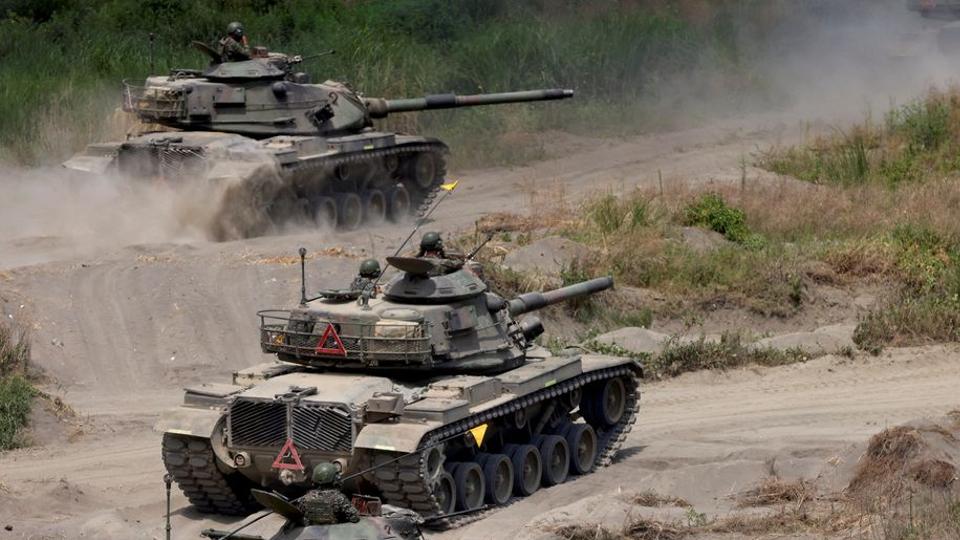China carried out its largest-ever military exercises around Taiwan after a visit by US House Speaker. Beijing saw the trip as an attempt by Washington to interfere in China's internal affairs.

Tanks operate on Bali beach while simulating a preventive measure to counter invasion as part of Taiwan's main annual "Han Kuang" exercise in New Taipei City, Taiwan. (Reuters)
Taiwan has proposed $19 billion in defence spending for next year, a double-digit increase on 2022 that includes funds for new fighter jets, weeks after China staged large-scale war games around the island it views as its sovereign territory.
The overall defence budget proposed on Thursday by President Tsai Ing-wen's Cabinet sets a 13.9 percent year-on-year increase to a record T$586.3 billion ($19.41 billion).
That includes an additional T$108.3 billion in spending for fighter jets and other equipment, as well as other "special funds" for the defence ministry. A statement from the Directorate-General of Budget, Accounting and Statistics did not provide a break down specifics on where the money would go.
The planned defence spending, which is a record high and must be approved by parliament, marks the island's sixth consecutive year of growth in defence spending since 2017.
The double-digit rise on 2022 marks a sharp increase compared with the island's defence spending growth in recent years; yearly growth has been below 4 percent since 2017.
Statistics department minister Chu Tzer-ming said the increase in defence spending will mainly go to operational costs.
Fourth-largest spending segment
"We always give safety and national security the top priority... that's why (the budget for) operational costs rises greatly," Chu said, pointing to costs such as fuel and maintenance for aircraft and ships dispatched to counter Chinese military activities near Taiwan.
Excluding the extra budget for military equipment and funds, proposed defence spending represents a 12.9 percent year-on-year increase, compared with a 20.8 percent increase in the overall government budget proposed for next year.
That proposed spending accounts for 14.6 percent of the government's total spending for next year and is the fourth-largest spending segment, after social welfare and combined spending on education, science and culture, and economic development.
The island last year announced an extra defence budget of $8.69 billion by 2026, which came on top of its yearly military spending, mostly on naval weapons, including missiles and warships.
In March, China said it would spend 7.1 percent more on defence this year, setting the spending figure at 1.45 trillion yuan ($211.62 billion), though many experts suspect that is not the true figure, an assertion the government disputes.
Tsai has made modernising the armed forces - well-armed but dwarfed by China's - a priority.
China is spending on advanced equipment, including stealthy fighters and aircraft carriers, which Taiwan is trying to counter by putting more effort into weapons such as missiles that can strike far into its giant neighbour's territory.
China has not ruled out using force to bring the island under its control. Taiwan rejects Beijing's sovereignty claims, saying that the People's Republic of China has never ruled the island and that only Taiwan's people can decide their future.
Taiwan has proposed $19 billion in defence spending for next year, a double-digit increase on 2022 that includes funds for new fighter jets, weeks after China staged large-scale war games around the island it views as its sovereign territory.
The overall defence budget proposed on Thursday by President Tsai Ing-wen's Cabinet sets a 13.9 percent year-on-year increase to a record T$586.3 billion ($19.41 billion).
That includes an additional T$108.3 billion in spending for fighter jets and other equipment, as well as other "special funds" for the defence ministry. A statement from the Directorate-General of Budget, Accounting and Statistics did not provide a break down specifics on where the money would go.
The planned defence spending, which is a record high and must be approved by parliament, marks the island's sixth consecutive year of growth in defence spending since 2017.
The double-digit rise on 2022 marks a sharp increase compared with the island's defence spending growth in recent years; yearly growth has been below 4 percent since 2017.
Statistics department minister Chu Tzer-ming said the increase in defence spending will mainly go to operational costs.
Fourth-largest spending segment
"We always give safety and national security the top priority... that's why (the budget for) operational costs rises greatly," Chu said, pointing to costs such as fuel and maintenance for aircraft and ships dispatched to counter Chinese military activities near Taiwan.
Excluding the extra budget for military equipment and funds, proposed defence spending represents a 12.9 percent year-on-year increase, compared with a 20.8 percent increase in the overall government budget proposed for next year.
That proposed spending accounts for 14.6 percent of the government's total spending for next year and is the fourth-largest spending segment, after social welfare and combined spending on education, science and culture, and economic development.
The island last year announced an extra defence budget of $8.69 billion by 2026, which came on top of its yearly military spending, mostly on naval weapons, including missiles and warships.
In March, China said it would spend 7.1 percent more on defence this year, setting the spending figure at 1.45 trillion yuan ($211.62 billion), though many experts suspect that is not the true figure, an assertion the government disputes.
Tsai has made modernising the armed forces - well-armed but dwarfed by China's - a priority.
China is spending on advanced equipment, including stealthy fighters and aircraft carriers, which Taiwan is trying to counter by putting more effort into weapons such as missiles that can strike far into its giant neighbour's territory.
China has not ruled out using force to bring the island under its control. Taiwan rejects Beijing's sovereignty claims, saying that the People's Republic of China has never ruled the island and that only Taiwan's people can decide their future.
No comments:
Post a Comment